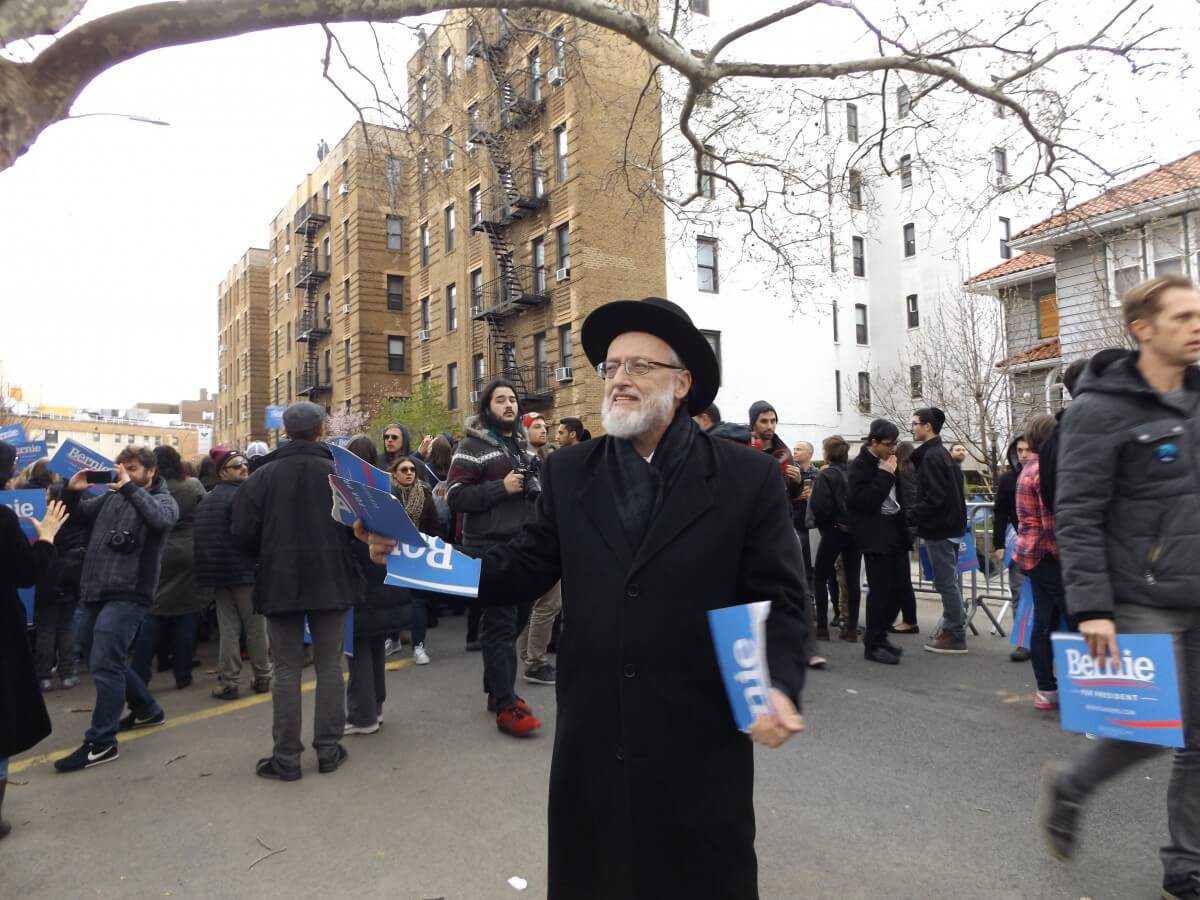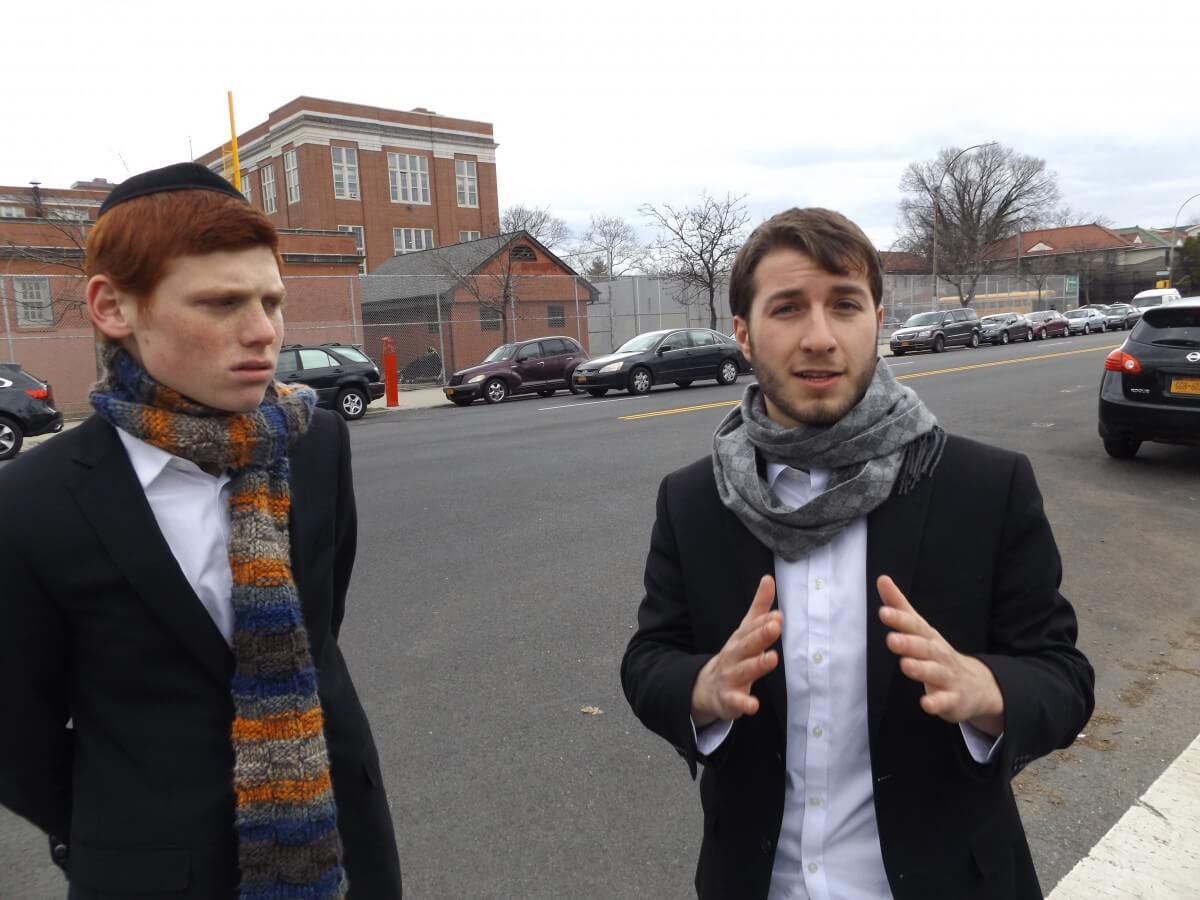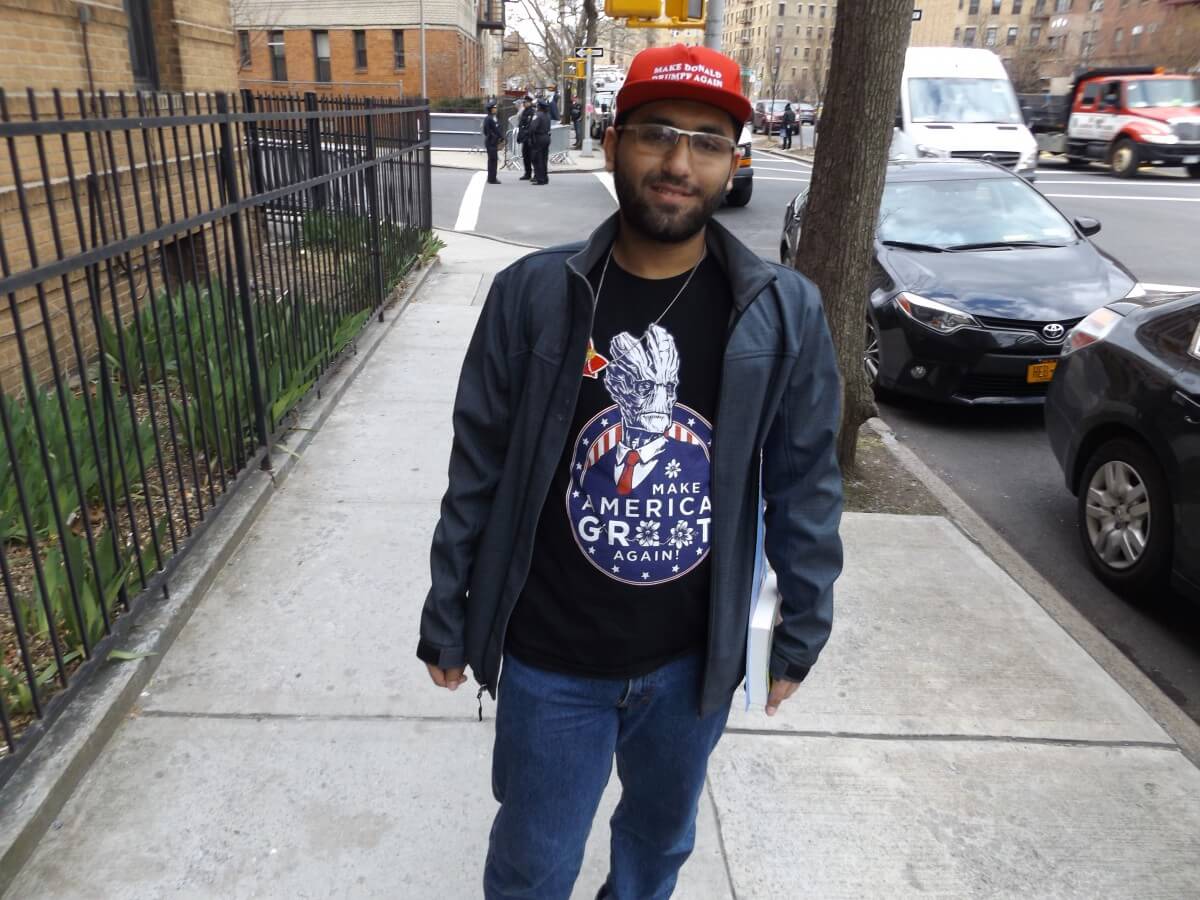Brooklyn is the Jerusalem that works.
Evidence of its superior functionality was on display on Friday, when Vermont Sen. Bernie Sanders returned to his Old Neighborhood in Brooklyn, a place home to both Muslims and Orthodox Jews, who live as much harmony with each other as anybody in New York City. The contender for the Democratic presidential nomination made the visit as he campaigns in New York ahead of an April 19 primary vote.
Unlike any other campaign this year, Sanders’ bid for the presidency has brought together and proved a powerful political common cause for American Muslims and Jews, who now volunteer side-by-side for his campaign as friends and colleagues. Many are members of Facebook groups like Muslims for Bernie, Jews for Bernie or Arabs for Bernie. Sanders has swept the Muslim vote in multiple states, part of a wider awakening of political activism among American Muslims and Arabs — from which Sanders has been the main beneficiary.

Bernie in Brooklyn (Photo: Wilson Dizard)
On Saturday, Sanders answered a question on Israel Palestine from a protester at the Apollo theater skeptical of Sanders relationship to Zionists and to Jews. The man, John Prince,
“You went to Israel for a year. As you know, Zionist Jews—I don’t mean to offend anybody—they running the Federal Reserve, they running Wall Street, they’re running everything. What is your relationship with your Jewish community?” Prince said, according to the Observer.
Sanders shook his finger, waiting to speak.
“Brother, brother, brother…” Sanders said. “No, no, no, no, no, that’s not what you’re asking. No that’s not what you’re asking. I’m proud to be Jewish,” Sanders said to applause.
“I am a strong defender of Israel, but I also believe that we have got to pay attention to the needs of the Palestinian people,” he said, to a long chorus of applaus and “Bernie! Bernie! Bernie!”
“There are wonderful people — and I have met the — on both sides of that issue, and there are bad people on both sides of that issue. If we are going to bring peace, hopefully, God willing, in the Middle East, We’re going to have to treat both sides with respect and equality,” Sanders said.
The senator was expressing what common sense would suggest is a common sense way of negotiating a peace deal or a large Starbucks order. Nowadays, common sense sounds revolutionary.
Looking at Sanders’ neighborhood in 2016, it’s fitting that his campaign should be the matchmaker that makes this match. Mosques and synagogues are scattered across the borough, within just a few blocks of each other sometimes. Orthodox Jews pick up Yiddish newspapers at Yemeni-run bodegas. Women in hijab go jogging through Prospect Park as Hasidic families feed swans nearby. There’s no holy stone, sacred shrine or despised wall nearby that is the source of strain.
But for one rabbi, who tore up a Sanders sign after the Senator spoke, Sanders is a source of strain.

Rabbi Nachman Caller (Photo: Wilson Dizard)
“He’s an anti-semite! He hates Israel!” The white-bearded elder yelled out on 26th street as hundreds departed the scene of the speech. Several bystanders, also Orthodox, took photos as he tore up the sign theatrically. I also took photos. Other bystanders laughed or confronted the sign-destroyer with their own signs like “Welcome Home Bernie!”
The rabbi walked away and I followed him.
“Hi, sir, what’s your name?” I asked.
A yarmulke-wearing teen informed me it was pointless as the man strode away. “He’s not going to talk to you.” Because duh, idiot.
But a young Hasidic man, who appeared to be in his mid-20s, turned to me and told me what I’d wanted to know, and later confirmed with a google search.
“That’s Rabbi Nachman Caller,” the man, who wanted to be identified only as Baruch, told me. Caller, a lawyer, had been a figure in local politics.
Baruch likes Sanders, but he’s not a registered Democrat so he can’t vote this year in the state’s primary. He said that most other members of his community were skeptical of Sanders, or even hostile to his positions on Israel. The secular senator has said his religion boils down to the golden rule, more than observing the pentateuch.
“So obviously there’s no major love, especially not from Rabbi Caller,” Baruch explained.
Baruch has issues with the sometimes angry-sounding tone of Sanders campaign, but is by and large sympathetic to the candidate.
“We’re both Jewish, grew up in Brooklyn, went to Israel when we were young. I see myself in him,” Baruch said.
I proposed to him the notion of Brooklyn being better than Jerusalem. He agreed.
“We’ve got everybody! We’ve got hispanics, Muslims, Jews. And it’s flat. You’re not walking up and down hills all the time,” Baruch added.
But for the borough, the most important thing in 2016 is not nominating Sanders, but defeating Donald Trump, Baruch said.
“Trump is a bigot,” Baruch said. “He says he wants to ban all Muslims, but I believe he wants to execute all Muslims. That’s not what Brooklyn is about.”
The Jewish enclave of Midwood, Sanders’ old stomping grounds, borders another neighborhood just to the west of it, Kensington, where many south asian muslims, many from Bangladesh and Pakistan, live just like millions of other New Yorkers do, worrying about the late train or the late rent. There are no checkpoints in between these neighborhoods. Brawls don’t break out between gangs of fist-throwing youth for religious reasons. It’s a miracle.
Brooklyn’s legal system suffers from deep flaws and inequalities, but it is at least a few shades more fair than Jerusalem’s. And it’s not a miracle, actually. It’s the realization of the purpose of the U.S. Constitution, which establishes a secular system of laws — not a church — that lets even rival religions exist side by side in peace. It’s a meaningful project, and far from complete. Sanders, as the first Jewish president, would be a product of a document that prohibits religious tests.

Ben Tzion Sacks, right, and a friend (Photo: Wilson Dizard)
But other Jews in the neighborhood see politics differently from Baruch. Down the street, Ben Tzion Sacks, 20, doesn’t see anything wrong with banning Muslims from entering the country — a religious test.
“Number one is because he’s not bought by all those special interests. And he’s not scared to say the truth about the refugees,” he said. If Trump prevails, the United States will not face the same fate as “what’s happening in Europe with refugees,” where there have been a series of recent attacks — in Paris and Brussels — carried out by European-born Muslims in the name of ISIS.
“And he knows how to get things done, he’s very good at that,” Sacks added.
Sacks just lives in the neighborhood where Sanders grew up and spoke like a born-and-bred New Yorker. A kid who was still learning how to read when September 11 happened.
Meanwhile, a man nearby holding a sign that said “#NYCTruthCommission” shouted statements.
“Stop paying for gasoline!” he exclaimed. “Stop paying for water.”
Another reporter finished interviewing Sacks.
“Stop paying to live here! Those are the issues,” the guy with the sign yelled again.
I started asking Sacks some of the same questions I asked Jewish attendees of this year’s AIPAC conference. And I got similar answers.
“What do you think about Trump’s association with Nazis?” I asked him.
Sacks was smoking a cigarette near the local public school, alongside a red-headed friend who said little except that he was too young to vote. He didn’t miss a beat answering the question on Trump’s ties to the far right, both online and offline.
“I don’t think he has any association with Nazis, I think that just because nazis endorsed him and also the Ku Klux Klan endorsed him doesn’t mean he pro-them. I don’t think that’s true. I think that’s stupidity,” Sacks explained.
The red-headed kid next to him just stood there. Both wore yarmulkes and L.L. Bean looking clothes, festive scarves, not like the austere style of Baruch, who was outfitted in a well-pressed rekel, a long black coat customary among Hasidic Jewish men.
Talking to Baruch and Sacks was kind of like stepping into a surreal spin off of The Chosen.
In this case, the observant Jewish youth, Baruch, was into universal health care and raising the minimum wage, while the nationalist kid, Sacks, tobacco smoke curling from his lungs, advocated giving a WASP from Queens a monopoly over the legal use of force in order to keep out Muslims desperate for shelter from war.
But Sacks explained that it’s because of the problems.
“Do you see any parallels in anti-Muslim and anti-Semitic bigotry?” I asked.
“No I don’t, just because. I don’t think that’s racism, the fact that he wants to ban Muslims. Because there’s a big problem in the Muslim community and that’s true.”
But what about when Jews were turned away during the Holocaust? In supporting the acceptance of refugees, American Jewish leaders have made the same parallel.
“You have to know exactly what the situation was then, and the reason they didn’t want to take in Jews. We would love to take in Muslims if there would not be a problem. You have to know how big the problem is,” Sacks said.
“The fact is that with Muslims the risk is a lot higher. We’re talking about blowing up innocent people and killing innocent people that’s a whole different story. You have to know how big the risk is,” he said.
In the immediate aftermath of World War II, an armed Jewish group had been doing just that — blowing up innocent people for political reasons— in attacks directed at our closest ally in the world, The United Kingdom.
To seize Palestine from the British empire, the armed wing of the Zionist movement in the 1940s employed guerilla tactics developed by the Irish Republican Army, which had itself just expelled armed Anglo-Saxons after about 1000 years of continuous colonization and occasional attempts at genocide by sword, bullet, famine or all three. Building bombs and blowing them up seemed to have worked for the IRA, and it would end up working for the Irgun, too. Just as other modern insurgencies have done since, attacks by the Irgun were meant to instill fear in the subjects of the Crown living in the Mandate, the kind of “blowing up innocent people” Sacks was concerned about.
“What about the King David Hotel?” I asked, referring to a 1946 bombing carried out by an armed ZIonist group, the Irgun. It killed 91 people and wounded another 46. Along with British officials, Palestinian Arabs and Jews were among the dead.
“What about it?” The youth asked.
“Nevermind,” I replied. “Very cool. Listen, man: thank you. Thanks again.”
“Who are you reporting this for?” Sacks asked.
“Oh, we’ll find out. I’m a freelancer.”
As I almost always do, I decided against indulging in some self-righteous diatribe about how heartless acts of political violence or unauthorized-freedom-fighting haunt the ethnic backgrounds of lots of people, who have nothing to do with injuring anybody themselves. For instance, despite claiming some Irish forebearers, I’ve never had anything personally to do with Hibernian politics or Fenian agitation, in case you’re wondering. Nor would I. I’m an American. We have our own history of civil war — and strained ceasefire over it — to deal with.
And I was there to report news, not debate history and ethics. Discussions like that take hours and usually go nowhere or not very far. And this is the news business, not political philosophy. I had a deadline in like 48 hours. Had to get moving.

Zawar Shah (Photo: Wilson Dizard)
The next person I caught up with was one of Sacks’ Muslim neighbors, Brooklyn college psychology student Zawar Shah, also 20, who was wearing a “Make Donald Drumpf Again” hat and a shirt that read “Make America Groot Again,” a reference to the film Guardians of the Galaxy, a not-half-bad space opera/screwball comedy you should check out. But finish reading this first.
“I personally believe what Sanders is saying,” he said. Born in Brooklyn, Shah has been to Pakistan and blames the poverty and discord there on cheating, dishonest politicians. Sanders, by contrast, is someone he believes.
“I can’t even believe that I live on his old block,” Shah said, something he only found out that day.
As for Trump, his gripe is personal.
“I don’t really like how people are treating the Syrian refugees, for instance. And Muslims in general. I’m Muslim,” Shah said.
For months, Trump has hammered down his message that Syrians present a danger to the United States, with his stump speech compares taking in refugees to taking and caring for a wild snake. It’s resonated with Shah’s neighbors, young men his age like Sacks.
When Shah started talking about Trump on Twitter, some people unfollowed him. But he was able to show them what he meant with one powerful sentence.
“I normally tweet normal, cute stuff,” he said. “And then when I posted one thing online said ‘My family can never come into this country, if Trump is president.’ They stopped unfollowing me. That stopped happening. I kept it pinned and people started supporting why I was supporting Sanders, even conservative people.”
I told Shah about what Sacks had said. He said he would try to engage in conversation with someone who felt that Muslims were threatening.
“I can understand fear given how much the media keeps pushing it in their face,” he said. “I would try to reason with them.”
“There is hope for this country. There is hope for everything. I believe in America that is 100 percent free in the religious prospect. I hear all about these people who are saying these Muslims want to implement shariah law. I don’t. I don’t want to,” Shah said.
“I don’t want to live in a Muslim haven; I don’t want to live in a Christian haven; I don’t want to live in an atheist haven,” he explained. “I just want in a country where we can believe whatever we want. And Bernie Sanders stands for that.”
Source Article from http://mondoweiss.net/2016/04/bernie-sanders-and-the-brooklyn-dream/
Related posts:
Views: 0
 RSS Feed
RSS Feed

















 April 11th, 2016
April 11th, 2016  Awake Goy
Awake Goy  Posted in
Posted in  Tags:
Tags: 
















